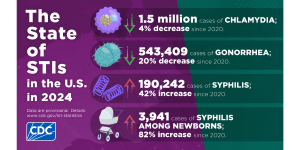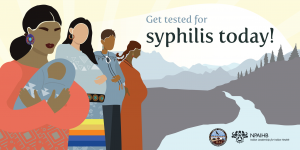
Syphilis Rates in Pregnant Women Continue to Rise
Syphilis rates among pregnant women went up 222% percent between 2016 and 2022 and another 28% between 2022 and 2024. This alarming increase shows too many pregnant women are not being screened.

How are STIs transmitted? When should someone be tested? A national survey from the Ohio State University Wexner Medical Center finds many in the U.S. struggle when answering those questions.
The Centers for Disease Control and Prevention released their annual surveillance report on STIs earlier this year and the numbers are sobering: 1.6 million cases of chlamydia and nearly 650,000 cases of gonorrhea. The report also documented more than 207,000 cases of syphilis, an 80% increase since 2018; in the same interval rates of congenital syphilis (when the infection is passed to a fetus during pregnancy) jumped a staggering 183%.
There’s no simple answer to explain these numbers, but lack of awareness about how STIs are transmitted (and prevented) surely contributes. The Ohio State researchers surveyed 1,005 adults in the U.S. and found:
To explore these topics, ASHA spoke with Abigail Norris Turner, PhD, an infectious diseases epidemiologist and professor with the Ohio State University College of Public Health. Dr. Turner says the sharp uptick in syphilis infections is driven by many factors, including people’s perception of their risk: “Some people are surprised to learn that syphilis continues to circulate today – they associate it with a bygone era.”
She says current guidelines call for syphilis testing of all pregnant people at the first prenatal visit, but it wasn’t always that way: “For decades, screening guidelines varied by state. Providers used their clinical judgement to determine who needed a syphilis test during pregnancy. That led to missed opportunities for testing and thus also missed opportunities to avert congenital syphilis cases.”
Dr. Turner says stigma plays a role, too. “Most people don’t want to talk about their STI risk, and many are not open to messages encouraging them to get tested for STIs, even when they are symptomatic. If they do get a test and it comes back positive, it can be very hard to tell recent partners. Some people choose not to let their past partners know of their potential infection because of the stigma of having, and possibly transmitting, an STI. Stigma contributes to ongoing cycles of transmission and are part of the increased STI rates we see today.”
Shrinking budgets make it even more challenging to combat the current surge in STIs. “Reduced funding makes it harder for public health programs to get their messages of testing and treatment out to the community. Those messages were especially hard to deliver during COVID. Post-pandemic, people have largely returned to their pre-pandemic sexual lives, but the underlying prevalence of many STIs is higher now than in 2020. It’s critical that public health programs have the resources they need to continue testing and treating these infections.”

Syphilis rates among pregnant women went up 222% percent between 2016 and 2022 and another 28% between 2022 and 2024. This alarming increase shows too many pregnant women are not being screened.

The CDC just released STI Surveillance Data for 2024 that show cases of chlamydia, gonorrhea, and syphilis are slowly declining.

The American College of Obstetricians and Gynecologists released new guidelines recommending that all pregnant people be screened for syphilis three times during pregnancy.

A new report from the Centers for Disease Control (CDC) shows that we’re missing opportunities to prevent congenital syphilis and save lives.

According to the Great Plains Tribal Epidemiology Center, syphilis rates among Native Americans in Iowa, Nebraska, North Dakota, and South rose 1,865% from 2020 to 2022.

A new study found that opt-out screenings for all patients in emergency departments caught numerous cases of syphilis and HIV that would have gone undetected under other screening protocols.

Syphilis can be treated more easily if it is caught early. But undiagnosed and untreated syphilis can be dangerous. It can cause irreversible health damage and even death.

Syphilis cases in newborns are skyrocketing—up 183% since 2018. Congenital syphilis is a public health crisis. If you want to help spread the word about the state of congenital syphilis and syphilis prevention, you can share these images and messages below on all of your
ASHA believes that all people have the right to the information and services that will help them to have optimum sexual health. We envision a time when stigma is no longer associated with sexual health and our nation is united in its belief that sexuality is a normal, healthy, and positive aspect of human life.
ABOUT
GET INVOLVED
ASHA WEBSITES
GET HELP
© 2026 American Sexual Health Association
We need to know if we can keep you company during this visit. We are useful for making this site work.
We use cookies to enhance your browsing experience. You can choose which cookies you want to accept.
Necessary cookies help make a website usable by enabling basic functions like page navigation and access to secure areas. The website cannot function properly without these cookies.
| Cookie | Provider | Purpose | Expiry |
|---|---|---|---|
digiconsent | This website | Stores your cookie consent preferences. | 1 year |
wordpress_logged_in_* | WordPress | Identifies logged-in users and their authentication details. | 14 days / Session |
wordpress_sec_* | WordPress | Stores authentication details for secure areas. | 14 days / Session |
wp-settings-* | WordPress | Stores user interface customization preferences. | 1 year |
wp-settings-time-* | WordPress | Stores the time when wp-settings cookie was set. | 1 year |
Analytics cookies help us understand how visitors interact with our website by collecting and reporting information anonymously. This helps us improve our website.
Marketing cookies are used to track visitors across websites. The intention is to display ads that are relevant and engaging for the individual user.
Functional cookies enable the website to provide enhanced functionality and personalization. They may be set by us or by third party providers.